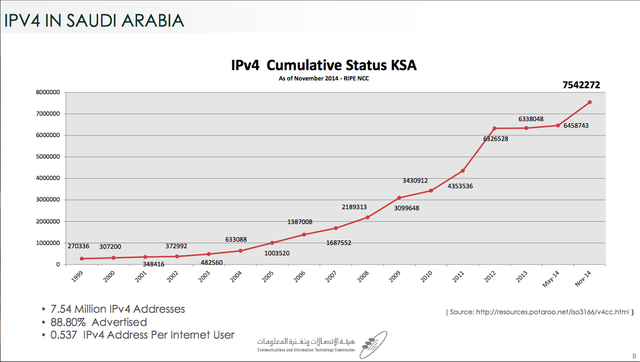RIPE NCC staff and RIPE community members recently participated in a meeting of the Saudi Arabian IPv6 Task Force, which was held in Al-Khobar on 20 November 2014.
The meeting was held in conjunction with a MENOG IPv6 Roadshow, a three-day, hands-on training course for network engineers, in which 29 participants learned how to deploy IPv6 in their own networks.
The Saudi Arabian IPv6 Task Force was held in the eastern city of Al-Khobar, which is home to the Saudi Arabian oil industry. As a result, several representatives from Aramco joined this meeting in addition to leading telecoms and Internet providers.
Anas Asari (CITC) opened the meeting by providing an overview of the Internet market in Saudi Arabia, highlighting the rapid growth in Internet penetration from 55% in 2013 to 60.1% in the first half of 2014. The main growth is in mobile broadband, where another seven million subscriptions now brings the total close to 21 million active users. He again stressed the need to adopt IPv6 to accommodate this growth and relieve stress on the IPv4 resources held by Saudi operators. The size of this need was illustrated by an overview of the number of IPv4 addresses registered to networks in the country. After a few years of stagnation following the RIPE NCC run-out, this number is now rising again as a result of IPv4 transfers towards Saudi Arabian operators.

Mr. Asari also pointed to the fact that the extensive use of Carrier Grade NAT or other address sharing technologies has implications for law enforcement, hampering their ability to quickly identify the user of a specific IP address.
This presentation was followed by an overview of the IPv6 activities of the meeting's host, Sahara Net, the first operator in Saudi Arabia to deploy IPv6. After obtaining the necessary information during the RIPE 57 Meeting in Dubai in October 2008, they launched their first IPv6-ready services in November 2009. He added that, while Sahara Net has been offering IPv6 for several years, there is still only a small number of customers actively using it and raising awareness among users is currently the big challenge. He closed his presentation with some recommendations regarding the careful planning required to deploy IPv6 in an organisation, calling on the attendees to start this process as soon as possible.
Hisham Ibrahim presented on behalf of the RIPE NCC and showed some of the IPv6 measurements being performed by the RIPE NCC, comparing results for Saudi Arabia to other countries in the Middle East and the RIPE NCC service region. He also gave an overview of the regional activities undertaken by the staff in the RIPE NCC's Dubai regional office, as well those coordinated from Amsterdam in raising awareness and building human and institutional capacity regarding IPv6 and other topics.
Sander Steffann, one of the IPv6 Roadshow trainers, provided the participants with several examples of how fast IPv6 use can grow once the leading telecom operators in a country decide to deploy it. Examples included Belgium (currently at 30.3 %), Switzerland (10.9%), and Peru (10.2%).
Participants had a chance during the coffee break to exchange experiences and acquire more information, after which Abdulrahman ALGhadir (CITC) presented on behalf of SaudiNIC, the nation's ccTLD registry. He gave an overview of how the registry became IPv6 ready and pointed out that, for a service to be fully IPv6 enabled, all levels of the DNS hierarchy should support IPv6, including making sure the local DNS servers are reachable over IPv6 and removing any remaining dependencies on IPv4.
Both STC and Mobily, the two leading telecom operators, gave a status update of their IPv6 deployment projects. They both confirmed that their backbone and wholesale IP and VPN services are IPv6 enabled and ready for service. Dr. Saad Munir (STC) announced that a phased roll-out of IPv6 in the DSL market will start in the first quarter of 2015, while compatibility and other tests are being done on their mobile broadband services. Mr. Abulaziz Aljoaid (Mobily) noted in his presentation that while IPv6 is technically available, there is a huge challenge on the business side, where making a positive case to recover the cost of IPv6 deployment is not easy.
In his closing remarks, Paul Rendek (RIPE NCC) gave an overview of the current situation with the IANA stewardship transition, asking the participants to not only focus on IPv6 but also to participate in the wider debate regarding Internet governance. He thanked CITC for their invitation and their ongoing engagement with RIPE NCC and the Internet community on the deployment of IPv6, as well as other topics. Participants had a chance to share their thoughts about how the RIPE NCC can assist the Saudi Arabian Internet industry in achieving their goals over lunch.
Learn more about the Saudi Arabian Taskforce. All the presentations are available from the meeting archive .





Comments 0
The comments section is closed for articles published more than a year ago. If you'd like to inform us of any issues, please contact us.